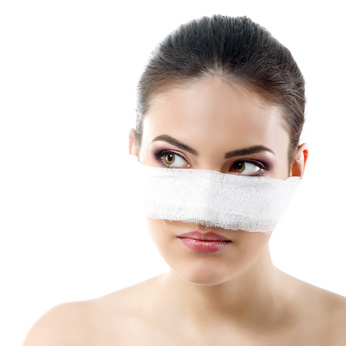The Rhinoplasty Recovery Process
What to Expect When Recovering from Rhinoplasty –
While rhinoplasty – aka a “nose job” – is a serious surgery, it is also very common and safe surgical procedure. When performed by a board certified plastic surgeon, such as Dr. Ali, recovery problems are extremely rare and you are ensured beautiful, long-lasting results.
However, following the advice of your plastic surgeon after a rhinoplasty procedure is crucial to ensuring the long-term success of your nasal procedure! The information in this article is general in nature only to give you an idea what a person can typically expect after a nose job surgery. However, every surgery is different – so always discuss your procedure with your surgeon and follow their specific suggestions and recommendations for your rhinoplasty aftercare and recovery.
The First Week After Rhinoplasty Surgery
- Immediately after your surgery is completed, you’ll be given a small, aluminum frame to cover your nose. This will ensure your nose is protected adequately during the first week of recovery.
- In some situations the physician may need to use nasal packing to stabilize the nose after the procedure. Soft silicone splints can also be used to stabilize the internal structures of the nose during the first week of recovery.
- You will experience a bit of discomfort or pain after the surgery, however with the use of long-term anesthetic, discomfort after a rhinoplasty is very minimal. (Note that any significant increase in pain after your procedure is a sign to call your surgeon immediately.)
- Swelling will occur after surgery, so you can expect to feel congested for a while after. Your nasal passages may be partially or completely obstructed. However, splints can prevent complete blockage. To ease this congestion, you can take an over-the-counter decongestant with your doctor’s approval.
- To reduce swelling, keep your head elevated higher than your heart. Bruising and swelling are usually worse on the second day after your surgery, but will improve after that.
- For about 48 hours after your nose job, you will have a drip pad under your nostrils for nasal discharge. This will collect blood or excess liquid – which is normal for the first few days. Be sure to clean the drop pad every time you clean your nasal area.
- It is important to keep the area clean and free of blood and other liquids. Dip a Q-tip in hydrogen peroxide and gently clean the inside of your nostrils. You can then use an antibiotic ointment to prevent dried blood, with the permission of your doctor.
1 Week After Rhinoplasty
- Any external sutures used will be removed about a week after your surgery. If splints were used, they will be removed when your cast is removed.
- Keep the now exposed incision area clean by wiping it very gently with a Q-tip soaked in hydrogen peroxide, and apply an antibiotic ointment to the incision two to three times a day.
- After 1 week the pain and discomfort should have subsided substantially.
- It is normal to experience a temporary loss of sensation in the tip of your nose, upper front teeth and/or roof of your mouth after a rhinoplasty. Nasal surgery causes a temporary disruption in the nerves in this area. Over the weeks following surgery, all sensation should return to normal.
- Just as with numbness, your sense of smell may be altered due to disruption of some nerves during the procedure. You may notice a slight decrease or alteration in both your sense of smell and taste. However, after about a week, this should improve, as well.
What to Avoid After Rhinoplasty
- For the first month following your rhinoplasty, you should plan to wear contact lenses instead of glasses. Avoid resting your glasses on the bridge of your nose until your surgeon gives you the okay.
- Do not travel by plane for at least two weeks to avoid problems with sinus blockage.
- Avoid any activity that can accidentally jar or injury the nose, such as vigorous sex, sports, or athletic activities until your physician gives you the go ahead.
- Once the incision has healed, be sure to wear sunblock for 6 months after your surgery to avoid discoloration.
When to Call Your Doctor After Rhinoplasty
If you notice any of the following, it is important to contact your surgeon right away:
- Fever exceeding 100 degrees
- Unusual or excessive bleeding from the nose
- Injury to the nose
- Significant increase in pain that cannot be managed by prescribed medication
Best Rhinoplasty Surgeon – Troy Michigan
Rhinoplasty is a routine procedure, and if you follow all after-care instructions as provided by your surgeon, you should have beautiful, long-lasting results. If you ever have questions or concerns during your recovery period, don’t hesitate to ask your surgeon.



